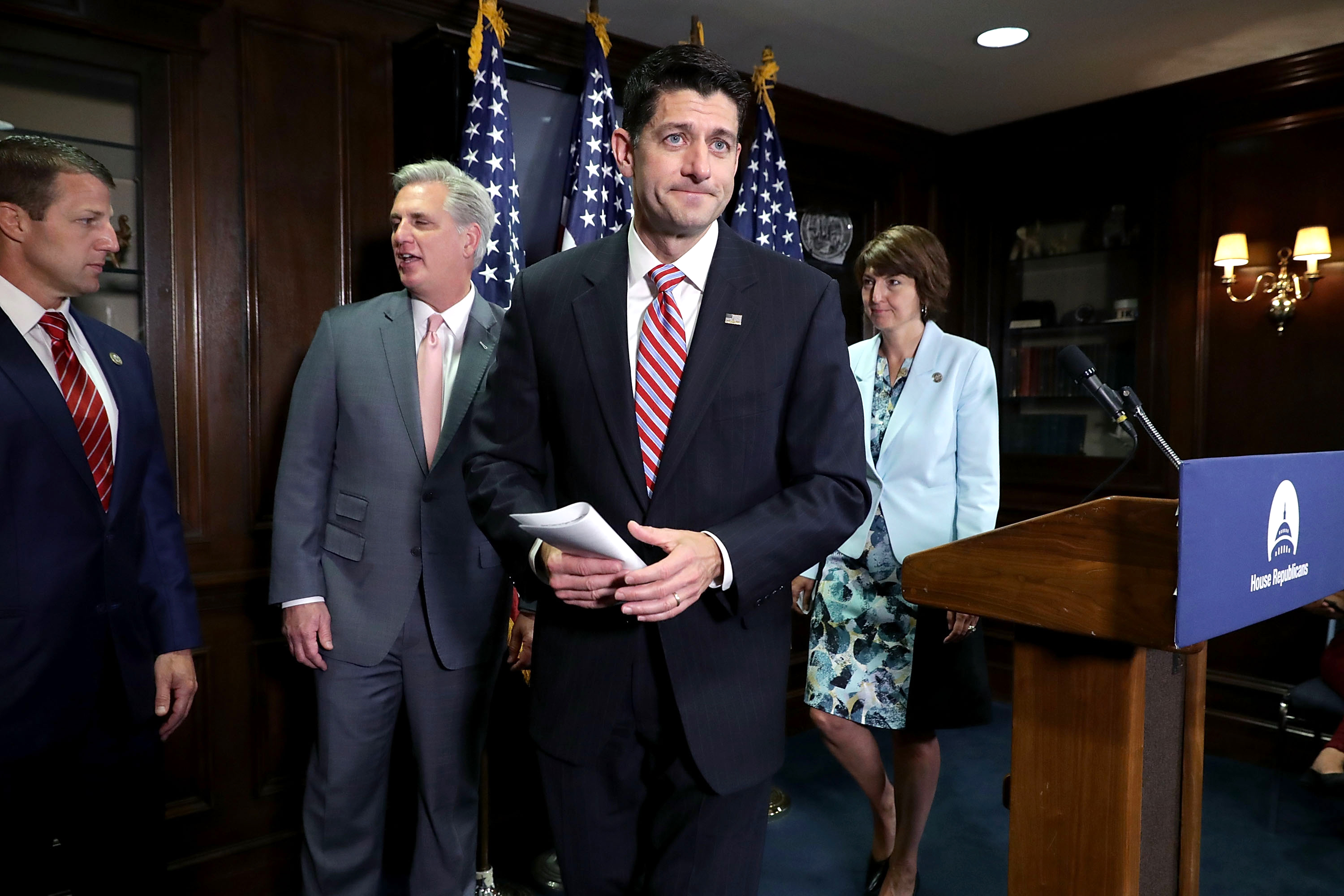The Republican Congress is officially giving up
It turns out that once you stop trying to do the stuff that's too politically dangerous to touch, there isn't much left to do


In a 1996 episode of The Simpsons, George H.W. Bush moves to Springfield and completes his memoir. "And since I'd achieved all my goals as president in one term," Bush writes, "there was no need for a second. The end." A similar sentiment appears to be gripping the Republican Congress. Now that they've achieved all their goals, what's the point in bothering with legislating?
As The Hill recently reported, with the November elections weighing increasingly on Congress' mind, "Republicans in the House are pivoting to messaging bills and away from the hot-button issues that have dominated the first two months of the year." In case you're wondering, a "messaging bill" is one that is intended less to solve a problem than to provide a talking point. Far better to do that than to grapple with a volatile issue like immigration or gun violence. On all those things, the GOP has essentially given up, like seniors in their last semester of high school.
Although the last 14 months has felt more like 14 years, the record of policy accomplishments from this Republican Congress has been remarkably thin. That wasn't what they had in mind when they took complete control of Washington for the first time in a decade, nor what many of us expected. It was supposed to be a smoothly running assembly line, with the House and Senate stamping out bills on conservative priorities as fast as President Trump could sign them. But once they failed at their first big priority, repealing the Affordable Care Act, the wind seemed to go out of their sails. They'd succeed at the one goal more important than all others — a big tax cut for corporations and the wealthy — but once that was done they seemed to collapse, breathless and sated, all their legislative energy exhausted upon the completion of that most glorious task.
The Week
Escape your echo chamber. Get the facts behind the news, plus analysis from multiple perspectives.

Sign up for The Week's Free Newsletters
From our morning news briefing to a weekly Good News Newsletter, get the best of The Week delivered directly to your inbox.
From our morning news briefing to a weekly Good News Newsletter, get the best of The Week delivered directly to your inbox.
And now, huge numbers of Republicans in the House — at least three dozen so far — are choosing to retire, heading off for lucrative lobbying careers or some other greener pasture. The most important reason is that it looks increasingly likely that Democrats will control the chamber after November, and being in the minority, to put it simply, just sucks. Your legislation never sees the light of day, the other party controls all the committees, and you begin to feel powerless and irrelevant (it's not nearly as bad in the Senate, where each individual senator has all kinds of privileges that give power and influence even to those in the minority).
But they've also found out that being in the majority has its problems, too, especially when your party controls the White House. When you have a majority but you're in the opposition, you can mount investigations and rail at the president's perfidy. But no Republican wants to conduct oversight of the Trump administration, which leaves them with little to do but defend the frequently indefensible Donald Trump.
And what about all that legislating they were going to undertake? Well it turns out that once you remove the stuff that's too politically dangerous to touch, there isn't much left to do. Sure, Republicans would like to dismantle Medicaid, privatize Medicare, slash the safety net, and outlaw abortion. But when the Democratic base is already energized and angry, all that doesn't seem like such a good idea if you want to hold on to your seat.
And the truth is that Republicans just aren't ideologically inclined to pass a lot of laws. They believe that government should do as little as possible, particularly when it comes to addressing social ills. They don't want to start new programs, and on many issues like guns, the status quo is fine with them. They're happy to see the Trump administration sabotaging the Affordable Care Act and undermining Medicaid, but they'd just as soon not go to the trouble of working on some complicated piece of legislation with political risk to accomplish the same thing.
A free daily email with the biggest news stories of the day – and the best features from TheWeek.com
There are a few things left on the Republican to-do list, including some bank deregulation (and on that one they're getting help from some Democrats). But in general, once they've cut taxes and eliminated some regulations on things like environmental protections and workers' rights, there just isn't all that much they want to do.
That doesn't mean they'll be happy to hand power over to Democrats, of course. If you're an anti-government conservative, holding power is important if for no other reason than stopping the pro-government party from passing a bunch of laws you won't like — and, of course, preventing them from engaging in any pesky oversight of the Trump administration.
When he ran for re-election in 1948, Harry Truman railed at the "do-nothing Congress" he said was stymieing his efforts to make the country run smoothly. This year, President Trump will tell voters to keep our contemporary do-nothing Congress around so it can continue doing nothing. And more than a few of those Republicans may be looking back wistfully at the good old days of 2015 or so, when they could spend their days investigating Hillary Clinton and Barack Obama, shaking their fists at the administration, and generally having a grand old time.
Paul Waldman is a senior writer with The American Prospect magazine and a blogger for The Washington Post. His writing has appeared in dozens of newspapers, magazines, and web sites, and he is the author or co-author of four books on media and politics.
-
 Marisa Silver’s 6 favorite books that capture a lifetime
Marisa Silver’s 6 favorite books that capture a lifetimeFeature The author recommends works by John Williams, Ian McEwan, and more
-
 Book reviews: ‘We the People: A History of the U.S. Constitution’ and ‘Will There Ever Be Another You’
Book reviews: ‘We the People: A History of the U.S. Constitution’ and ‘Will There Ever Be Another You’Feature The many attempts to amend the U.S. Constitution and Patricia Lockwood’s struggle with long Covid
-
 Philadelphia’s Calder Gardens
Philadelphia’s Calder GardensFeature A permanent new museum
-
 Ghislaine Maxwell: angling for a Trump pardon
Ghislaine Maxwell: angling for a Trump pardonTalking Point Convicted sex trafficker's testimony could shed new light on president's links to Jeffrey Epstein
-
 The last words and final moments of 40 presidents
The last words and final moments of 40 presidentsThe Explainer Some are eloquent quotes worthy of the holders of the highest office in the nation, and others... aren't
-
 The JFK files: the truth at last?
The JFK files: the truth at last?In The Spotlight More than 64,000 previously classified documents relating the 1963 assassination of John F. Kennedy have been released by the Trump administration
-
 'Seriously, not literally': how should the world take Donald Trump?
'Seriously, not literally': how should the world take Donald Trump?Today's big question White House rhetoric and reality look likely to become increasingly blurred
-
 Will Trump's 'madman' strategy pay off?
Will Trump's 'madman' strategy pay off?Today's Big Question Incoming US president likes to seem unpredictable but, this time round, world leaders could be wise to his playbook
-
 Democrats vs. Republicans: which party are the billionaires backing?
Democrats vs. Republicans: which party are the billionaires backing?The Explainer Younger tech titans join 'boys' club throwing money and support' behind President Trump, while older plutocrats quietly rebuke new administration
-
 US election: where things stand with one week to go
US election: where things stand with one week to goThe Explainer Harris' lead in the polls has been narrowing in Trump's favour, but her campaign remains 'cautiously optimistic'
-
 Is Trump okay?
Is Trump okay?Today's Big Question Former president's mental fitness and alleged cognitive decline firmly back in the spotlight after 'bizarre' town hall event
